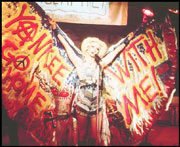27TH ANNUAL SEATTLE INTERNATIONAL FILM FESTIVAL runs Thurs., May 24-Sun., June 17 at Broadway Performance Hall, Cinerama, Egyptian, Harvard Exit, Pacific Place, and other venues
WORLD WAR II may soon be raging in theaters, with Pearl Harbor attacking over Memorial Day weekend, but there’s more to summer than Ben Affleck fighting CG-generated Zeroes. Even as the multiplexes brace for an invasion of school-vacationing kids, the seasonal return of SIFF signals a different sort of moviegoing experience—a truce, if you will.
Boasting some 240 features and documentaries (plus almost 60 shorts films), SIFF has grown to be the largest, most popular film festival in the U.S. It’s not a market where new titles are unveiled to swarms of eager buyers (like Sundance or Toronto); it’s not an international media event (like Cannes); it’s not a place where you’ll encounter Quentin Tarantino at the urinal next to you. (Strike that—Q.T. will be here, delivering a four-night lecture/screening series on his favorite forgotten American B-movie director.)
What is it, then? Located on the treacherous front lines of film, SIFF has endured and thrived because it’s never been conquered by either art or commerce. The festival owes its independent existence to you, the foot soldiers of cinema, the ticket-buying public. (Some 140,000 attended last year’s fest.) Scenesters and marketers really have no place here; we take our cues from the films, not the hype. Accordingly, movies that score with SIFF audiences range from the silly (Priscilla, Queen of the Desert, ’94) to the scary (Alien, ’79) to the sentimental (My Life as a Dog, ’87).
From that, we can see how SIFF’s identity is fundamentally populist and eclectic, which this year’s lineup reflects. Most of its programmers—who sort through hundreds of tapes and sit through dozens of festivals—are locals intimately acquainted with our tastes. They queue up with the rest of us in sodden movie lines, rub shoulders with us at Scarecrow. Thus we have a pure Hong Kong action flick like Gen-X Cops, Othello restaged in high school (O), and the timely dot-com debacle documentary Startup.com. There’s transsexual East German rock in Hedwig and the Angry Inch, international intrigue in Joint Security Area, and sweeping period romance in The Captain’s Daughter. (With a movie like Amy’s Orgasm, the title tells you all you need to know.)
BIG, BAD SIFF is the festival’s other, darker image. Malcontents grouse that it’s too long, too unfocused, that there’s too much to see—both good and bad—without any overarching, unifying theme. Most damningly, some accuse it of not supporting our indigenous film community. Last fall’s Seattle Underground Film Festival—SUFF, get it?—was seen as a pointed slap at SIFF, while last spring’s Satellites 2000 fest ran concurrently, if not competitively, with what some deem the 800-pound gorilla of the local film scene. (Satellites ’01 returns next week.)
“Seattle filmmakers in general felt like they were getting essentially ignored,” concedes SIFF co-founder and director Darryl Macdonald. “Local filmmakers are never satisfied with what a local festival offers—particularly if their film is rejected!” Still, Macdonald adds, he was determined that SIFF not be seen as “this enemy, this monolith that doesn’t respect anybody else’s point of view.”
City Council member Nick Licata was evidently thinking along the same lines and eventually helped find some Seattle Arts Commission money—plus cash from his own pocket—to help launch what SIFF has dubbed Shooting In Seattle. Co-programmed with representatives from the Seattle Art Museum, the Northwest Film Forum, and the 911 Media Arts Center, SIS will highlight and premiere around 20 local short flicks this festival and debut Bainbridge Islander Garrett Bennett’s feature film Farewell to Harry.
“All of us found that we had a lot more in common . . . than we might’ve hitherto thought,” says Macdonald of the co-curatorial effort. “I was astonished at how much our views were alike and how much our tastes were alike.”
With that d鴥nte established, reinforced with local troops, the festival marches on.








